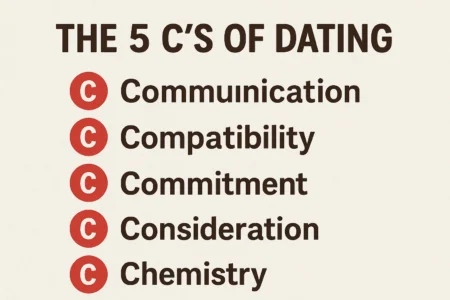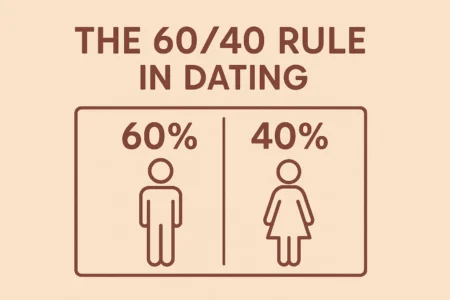Let’s be honest, bringing up money in a new relationship feels… icky. It’s like screeching a romantic movie to a halt to discuss spreadsheets. We’re taught it’s impolite, invasive, or just plain awkward. But here’s the cold, hard truth I’ve learned (the hard way): choosing a life partner without understanding their relationship with money is like buying a house without an inspection. You might get lucky and find a gem. Or, you could end up in a financial money pit, wondering how you missed all the warning signs.
Money, ultimately, isn’t just about dollars and cents. It’s a stand-in for our deepest values, fears, and priorities. How someone handles their finances is a direct reflection of how they handle responsibility, honesty, and planning. So, what is a financial red flag in a relationship? It’s not necessarily about a low salary or having debt. It’s about the behaviors around money—the secrecy, the control, the irresponsibility, or the fundamental mismatch in values that can corrode the trust your partnership is built on. Ignoring these flags doesn’t make them go away. It just gives them time to grow.
More in Dating Specific Types Category
What are the 5 P’s to avoid in dating
What are the red flags in the first stage of dating
Key Takeaways
- Financial red flags are rarely about the amount of money someone has; they are about behaviors like secrecy, control, and dishonesty.
- The number one red flag is financial secrecy. A partner who hides accounts, debts, or purchases is breaking the foundation of trust.
- Mismatched financial goals (e.g., a “super-saver” vs. a “live-for-today” spender) can be a red flag if both partners are unwilling to compromise.
- Financial control, such as one partner dictating all spending or limiting access to funds, is a serious form of emotional and financial abuse.
- Open, non-judgmental communication about money is the only way to identify and resolve potential red flags before they become relationship-ending crises.
Why Does Talking About Money Feel So… Awkward?
We can talk about our past relationships, our political views, even our weird health stuff. But money? That feels different. For many of us, money is tangled up with our sense of self-worth, shame, or family expectations. Maybe you grew up in a house where money was always a source of fighting, so now you just crave peace. Or perhaps you were taught that being “good with money” was a moral virtue, so you judge people who aren’t.
This cultural taboo is dangerous. It creates a breeding ground for misunderstanding and resentment.
When you avoid the “money talk,” you’re not just avoiding an awkward conversation. You’re skipping a crucial compatibility test. You can’t build a life with someone if you don’t know what they value. Do they prioritize security and saving for the future? Or do they believe money is a tool for creating experiences right now? Neither is “wrong,” but being on completely different pages is a recipe for disaster.
Is Your Partner a ‘Financial Phantom’? The Dangers of Secrecy
This, in my opinion, is the single biggest red flag. The Financial Phantom. This is the partner who treats their finances like a classified government secret. You might know where they live, but you have no real idea what their financial life looks like. It’s all smoke and mirrors.
What Does Financial Secrecy Actually Look Like?
It’s often subtle at first. You ask what they make, and they laugh it off with a vague, “Oh, I do okay.” You talk about moving in together, and when you try to discuss a joint budget, they get defensive, saying, “I’ll handle my share, don’t worry about it.” They might get mail you’re not allowed to see, or quickly close a browser tab when you walk by.
I once dated a guy we’ll call Mark. Mark was incredibly charming, smart, and fun. He also had a mysterious “consulting” job and a surprisingly nice apartment. It was intriguing. When I’d ask lighthearted questions about his work or budget, he’d just smile and say, “I’ve got it covered.”
I wanted to believe him. It felt romantic, like he was the “provider.”
Then, I started noticing the letters. They were always in angry red or stark white envelopes, marked “Urgent” or “Final Notice.” He’d snatch them from the mail before I could see the return address. One day, I was alone at his place and saw one on the counter. It was a collections notice for tens of thousands of dollars in credit card debt. My stomach dropped. It wasn’t the debt that scared me. It was the elaborate, multi-month lie. The trust I had? It vanished. Instantly.
Why is Hiding Money a Relationship-Killer?
A partnership is built on trust. Financial secrecy is a direct violation of that trust. It’s a form of deception, full stop. If your partner is comfortable lying to you about a credit card, a loan, or a secret bank account, what else are they comfortable lying about?
It also makes a shared future impossible. How can you plan to buy a house, have children, or even just take a vacation if you’re working with incomplete—or just plain false—information? You can’t. You’re not a partner; you’re an audience member watching a one-person show. And you have no idea when the curtain will fall.
Are Their ‘Bad Habits’ Just Quirks or Full-Blown Crises?
It’s one thing to be with someone who’s a little disorganized. Maybe they forget to pay a bill now and then or are more of a spender than you are. But when do those “quirks” cross the line into a five-alarm financial fire? It’s all about the pattern.
How Can You Tell If They’re Just ‘Bad with Money’ or in Real Trouble?
Look for recurring behaviors that show a lack of control or respect for money as a tool. A single instance isn’t a flag, but a pattern is a billboard.
- Chronic Impulsive Spending: We all treat ourselves. But is your partner constantly making large, unplanned purchases (a new car, a designer wardrobe, expensive tech) they clearly can’t afford, often followed by a period of “buyer’s remorse” or, worse, no remorse at all?
- Living in a State of ‘Bill Panic’: Are they always “forgetting” to pay their rent, car payment, or utilities? Do they brush off late fees as “no big deal”? This signals a deep-seated avoidance that will eventually catch up to them—and you.
- The Constant Borrower: Does your partner seem to be in a perpetual cycle of borrowing money from friends, family, or even you just to make it to their next paycheck? This is a massive sign they are living far beyond their means.
- Zero Savings. Ever: If they earn a decent income but have absolutely nothing saved for an emergency, it shows a “live-for-today” mentality that can be terrifying when a real emergency (a job loss, a medical issue) strikes.
- Any Hint of Secretive Gambling: This is a serious one. Unexplained cash withdrawals, constant “checking scores” on their phone, or defensiveness about betting apps can signal a compulsion that can destroy lives.
But What If They Just Have a Different ‘Money Style’?
This is a common one. You’re a meticulous saver, and they’re a generous spender. This isn’t an automatic red flag. In fact, different styles can sometimes balance each other out. The red flag isn’t the difference in style; it’s the refusal to compromise.
If your partner sees your desire to save as “boring” or “controlling” and refuses to even discuss a shared goal, that’s the problem. If they agree to a savings plan but then consistently “dip into” the joint account for non-essentials without talking to you, that’s not a “different style.” That’s disrespect. A healthy relationship finds a middle ground—a “yours, mine, and ours” approach where you both have freedom, but you also both contribute to a shared future.
Is Your Partner Using Money to Control You?
This is the darkest and most dangerous financial red flag. It often gets missed because it can be disguised as “caring” or “managing” the finances. Let’s be crystal clear: financial control is financial abuse.
It’s a tactic used to make you dependent, to isolate you, and to strip you of your autonomy. It’s not about money; it’s about power.
What are the Sneaky Signs of Financial Control?
Financial abuse rarely starts with a direct threat. It’s insidious. It might begin with your partner saying, “You work so hard, honey, why don’t you let me just handle all the bills?” It sounds helpful. But soon, you don’t know the passwords to the bank accounts. You don’t see the statements.
Other signs include:
- Putting you on an “allowance” (especially if you have your own income!) and making you “ask” for money.
- Questioning or demanding receipts for every single purchase you make, making you justify essentials like groceries or gas.
- Forbidding you from working, or actively sabotaging your job (e.g., hiding your keys so you’re late, picking fights before a big interview).
- Insisting that all joint accounts, car loans, or leases be in their name only, leaving you with no credit or assets in your own right.
- Using patronizing language like, “Don’t worry your pretty little head about it,” to dismiss your financial questions.
Why This Isn’t Just ‘Old-Fashioned,’ It’s Dangerous
If any of this sounds familiar, please understand: this is not a “money problem.” This is a control problem. As researchers at Utah State University point out, financial abuse is a common and effective tactic used by abusers to gain power. It’s designed to make you feel trapped. By controlling your access to money, the abuser ensures that you don’t have the resources to leave.
If you feel like you’re walking on eggshells around money, or if you’re afraid to ask for access to your own funds, that is a massive, flashing-red-light warning.
Did You Just Discover Their ‘Secret’ Mountain of Debt?
This is the bombshell. You’re applying for an apartment, a car loan, or maybe even a mortgage. The loan officer comes back with a concerned look. Or, you stumble upon a statement by accident. And there it is: a secret, massive pile of debt your partner never, ever mentioned.
How Do People Even Hide Significant Debt?
In our digital world, it’s surprisingly easy. Paperless statements, separate email addresses, mail sent to a P.O. box… a person who is determined to hide something can do so for years. They might have credit cards you’ve never heard of or student loans they “forgot” to mention.
My best friend, Sarah, went through this. She was engaged to a man everyone adored. He was kind, stable, and great with her family. They went to pre-apply for a mortgage, and the loan officer gently pulled her aside. Her fiancé had over $80,000 in credit card debt and defaulted loans. He hadn’t made a payment in years.
She was completely blindsided.
Is Lying About Debt an Unforgivable Sin?
When I talked to Sarah later, she was crying. But what she said stuck with me forever. “You know,” she said, “I’m not even that angry about the debt. We’re a team. We could have made a plan. I’m angry because he looked me in the eye for two years and lied. He let me plan a wedding and a future with him, knowing this ticking time bomb was in his back pocket.”
She hit the nail on the head. The red flag isn’t the number. People get into debt for all sorts of reasons—a medical emergency, a bad business deal, or just plain old irresponsibility in their youth. The unforgivable part is the deception. It shows a profound lack of respect for you as a partner. They are willing to let you entangle your life—and your credit—with their hidden disaster.
What About Their Family? Are ‘Financial Enmeshment’ and ‘Mooching’ Red Flags?
This one is tricky because family is so emotional. But you’re not just partnering with one person; you’re partnering with their entire financial ecosystem.
When Does ‘Helping Family’ Become a Problem?
It’s admirable to want to help your family. But what happens when your partner’s “helping” becomes their family’s primary source of income? The red flag is a total lack of boundaries.
Does your partner’s irresponsible sibling constantly need a “loan” that never gets paid back? Are your partner’s parents living well beyond their means, with the expectation that your partner (and by extension, you) will fund their retirement?
The problem arises when your shared goals—like saving for your own home or retirement—are constantly being derailed to bail out their family members. If your partner can’t say “no,” or worse, doesn’t even see a problem, you are not their priority. Their family’s poor planning is.
What If They’re Still Financially Tied to Their Parents?
On the flip side, what about the partner who has “failed to launch”? This is the 30-something whose parents are still paying their car insurance, phone bill, and rent. While it might seem “nice” that they have this support, it can be a red flag for immaturity.
Are they a true, independent adult capable of being an equal partner? Or are they still financially (and perhaps emotionally) a “kid”? This dynamic means you’re not just in a relationship with them; you’re in a relationship with their parents’ bank account. And you’ll have very little say if their parents ever decide to “cut them off” or use that financial support to control your relationship.
So, You’ve Spotted a Red Flag. Now What?
Okay. You’ve read this, and your stomach is in knots because something sounds all too familiar. Don’t panic. But also, do not ignore it. An unaddressed financial red flag is like a small crack in a foundation. It will only get bigger, and more destructive, over time.
How Do You Even Start This Conversation Without a Fight?
The goal is to have a conversation, not a confrontation. How you bring it up is everything.
First, pick your moment. Do not bring this up in the middle of a fight, when you’re both stressed, or right after a big, impulsive purchase. Choose a calm, neutral time. A Sunday morning over coffee, or on a walk.
Second, use “I” statements. This is classic, but it works.
- Don’t say: “You are so secretive with your money, and you’re obviously in debt.” (Accusatory)
- Do say: “I feel anxious about our future when we don’t talk openly about money. It makes me feel like we’re not on the same team.” (Focuses on your feelings).
Third, be curious, not critical. Instead of demanding “Why do you spend so much?” try asking, “I’m curious about how you learned about money growing up. What was it like in your family?” This opens a door to understanding their behaviors instead of just attacking their actions. Their answers might reveal a lot.
What’s a ‘Green Flag’ to Look For?
Let’s end on a positive note. While we’re looking for red flags, it’s just as important to recognize the “green flags.” What does a healthy financial partner look like?
- Transparency: They are an open book. They’ll happily tell you their salary, their debts, and their financial goals. Not because you asked, but because they want you to know. They see you as a partner.
- Teamwork: You’ll hear them use the words “we” and “our” when discussing future plans. They’re excited to budget with you for a vacation or a shared goal.
- Respect for Your Independence: They want you to be financially strong, too. They encourage your career, celebrate your raises, and believe you should have your own money and autonomy.
- Accountability: If they do have debt from the past, they are proactive about it. They have a plan to pay it off and are open about their progress.
Trust Your Gut
It’s that gnawing feeling in your stomach that something is “off.” It’s the defensiveness when you ask a simple question. It’s the gap between the lifestyle they’re living and the income you know they have.
A healthy, lasting relationship requires a foundation of trust. Financial honesty is not an optional add-on; it’s a non-negotiable part of that foundation. These problems do not magically get better after you move in together, get married, or have kids. They get worse. Your financial future is too important to build with someone who is hiding in the shadows. You deserve a partner who is willing to step into the light with you.
FAQ – What is a financial red flag in a relationship
Why is financial secrecy considered the number one red flag?
Financial secrecy erodes trust because it involves hiding accounts, debts, or purchases, which suggests dishonesty. It prevents partners from planning a shared future and raises concerns about what else might be being concealed.
How can you tell if someone’s money habits are just quirks or signs of serious trouble?
Recurring patterns of irresponsible or uncontrolled financial behaviors, such as impulsive spending, avoiding bills, constant borrowing, lack of savings, or secretive gambling, indicate deeper issues rather than mere quirks.
What are the dangers of using money to control a partner?
Using money to control a partner is a form of financial abuse, which isolates, diminishes autonomy, and is rooted in power. Signs include giving allowances, questioning every purchase, forbidding work, or insisting on accounts only in one name.
What should I do if I discover my partner has hidden debt or financial secrets?
If you discover hidden debt or secrets, communicate calmly and openly, expressing concerns rather than accusations. It’s crucial to assess whether transparency can be established and consider seeking advice or counseling to address underlying issues.




